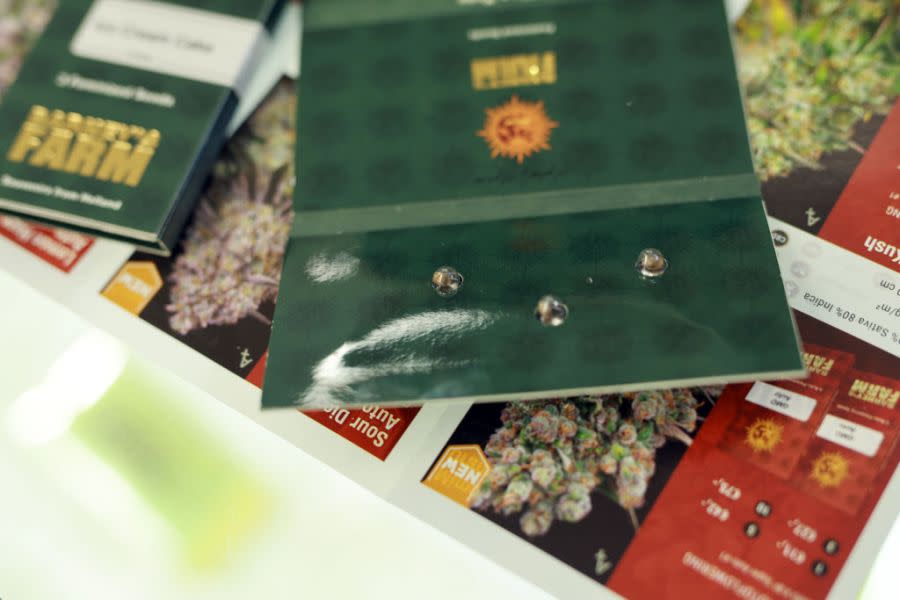Why cannabis seeds are Ohio’s only legal option to buy recreational marijuana

View a previous report on the Cleveland School of Cannabis, which offers courses on growing marijuana, in the video player above.
COLUMBUS, Ohio (WCMH) — In Ohio, where legislators have yet to approve a legal storefront for selling recreational marijuana, there remains one way that’s also federally permitted to buy the plant.
The marijuana won’t arrive ready to use, and will require gardening skills because it comes in the form of cannabis seeds. When voters approved Issue 2 in the November general election, it legalized growing, possessing and using recreational marijuana. but did not immediately define who could sell it when the amendment became law. Instead, it left that decision to the newly-created Ohio Division of Cannabis Control, which has rules for “dual-use dispensaries” on the way.
The Drug Enforcement Agency is actually responsible for confirming that cannabis seeds can be immune to federal regulation on a technicality. In a December 2022 letter to California attorney Omar Figueroa, DEA Diversion Control Division Chief Terrence Boos clarified that a seed’s concentration of THC, the component of marijuana responsible for its psychological effects, can result in it falling out of regulation under the U.S. Controlled Substances Act.
“Any seed, tissue culture, or other genetic material that has a delta-9-tetrahydrocannabinol concentration of no more than 0.3% on a dry weight basis meets the definition of ‘hemp’ and is not controlled under the CSA,” Boos wrote. “However, non-sterilized seed … having a delta-9-tetrahydrocannabinol concentration of more than 0.3% on a dry weight basis does fall within the CSA schedule I listing of marijuana.”

Kevin Greene, the vice president of the Cleveland School of Cannabis, told NBC4 that there’s little risk of a seed exceeding the THC limit enforced by the DEA.
“In its seed form, the THC has not cultivated and actualized itself, so there is no THC in the seed,” Greene said. “If you’re just not really good at growing, you’re going to get some low THC content even if you were trying to grow a high-quality product,”
Boos added that if the THC concentration surpassed 0.3% once the seed sprouted, it would become federally illegal again under the Controlled Substances Act. And Ohio’s recreational marijuana law only legalized up to six personal plants grown at home, limiting how many seeds could be cultivated at once. Attorneys in the state have noted that the law also doesn’t protect renters from stipulations on marijuana in a lease.
While the seeds are legal, finding a local vendor willing to part ways with them could be hit-or-miss. A spokeswoman for Sunnyside Dispensaries, which operates a marijuana growing facility in Ohio for its medical storefronts, told NBC4 that it intentionally avoids selling seeds directly to customers.
Because of the DEA’s stance on seeds, the dichotomy of legal and illegal marijuana going across state lines depends entirely on the plant’s maturity. For example, it’s still illegal to drive to Michigan’s recreational dispensaries and bring recreational cannabis products back to Ohio. But seeds brought back or even ordered online, fall into a different, rubberstamped class. Online vendors know this; a quick Google search turns up dozens of vendors’ websites marketing seeds specifically to Ohio.
For residents looking for seeds and how to cultivate them, they could get both at once. Greene noted the Cleveland School of Cannabis offers classes that provide seeds to students and teach them how to grow their own marijuana.
“Anyone that’s tried to grow anything at home, understands that even the easiest thing to grow still takes some education, some nurturing and some understanding of the process that you’re embarking on,” Greene said.
For the latest news, weather, sports, and streaming video, head to NBC4 WCMH-TV.
